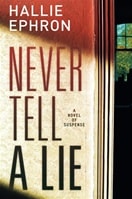(Publisher’s Weekly, Nov 17, Stephen Anable)
 Hallie Ephron—in wire-rimmed glasses, a black turtleneck and moonstone ring (“like in Wilkie Collins”)—is digging into a plate of Indian food in a glass-walled restaurant above Harvard Square in Cambridge, Mass. It’s an autumn New England day, not unlike the November morning when a yard sale upends the life of Ivy Rose, the pregnant woman protagonist in Ephron’s first stand-alone novel, Never Tell a Lie (Morrow, Jan.).
Hallie Ephron—in wire-rimmed glasses, a black turtleneck and moonstone ring (“like in Wilkie Collins”)—is digging into a plate of Indian food in a glass-walled restaurant above Harvard Square in Cambridge, Mass. It’s an autumn New England day, not unlike the November morning when a yard sale upends the life of Ivy Rose, the pregnant woman protagonist in Ephron’s first stand-alone novel, Never Tell a Lie (Morrow, Jan.).
“I didn’t want to write a traditional mystery, a whodunit, with a sleuth as my lead character,” says Ephron. “I’d long wanted to write about that moment when a woman steps off the career track to have her first child. For me, that was a scary time. I was worried about getting through labor and anxious that my baby would be born healthy. I felt marooned in my own home and utterly alone. Although I adored my husband, I hated feeling so dependent upon him.” Ivy is at just that point, when her life goes off the rails after a high school classmate, also pregnant, shows up at a yard sale and Ivy becomes a suspect in the woman’s disappearance.
Ephron comes from a renowned family. Her sisters are writers Delia and Amy and the writer-director, Nora. Her parents were “New York intellectuals” who moved west to work in Hollywood, but, Ephron says, “First and foremost, our parents listened to us. Both of them were screenwriters [Ephron recalls watching Marilyn Monroe rehearse a scene from her parents’ script for the film There’s No Business Like Show Business] and worked all day, but when we all sat down to dinner at 6:30 each night, my sisters and I were expected to talk—to tell stories about what had happened to us and to have opinions. My parents raised us to believe that we had something to say: that’s a gift.”
As “G.H. Ephron,” Ephron and her writing partner, neuropsychologist Donald Davidoff, collaborated on Amnesia (St. Martin’s Minotaur, 2000) and four other mysteries featuring forensic psychologist Peter Zak. After 2005’s Guilt, she and Davidoff each felt it was time to move on. She was happy though unsettled to leave established characters behind and “start from scratch” with a vulnerable woman like Ivy. “When you put your characters in a dire situation, they often do things that surprise even you, so you have to go back and revise your original conception of who they are,” Ephron says. Never Tell a Lie probes the angst that toxic times in high school can perpetuate deep into adulthood. “When something happens far back in the past people often can’t recall exact details. Blame depends upon point of view. There may be a villain, but reality is frustrating because it’s often ambiguous. That’s reflected in this book.”
“Most definitely not in the popular crowd” in high school, Ephron “was smart—editor of the school newspaper—but not the smartest. I was an outsider, never quite part of what was going on, always looking in. It turned out to be great preparation for writing fiction.” In fact, Ephron is hoarding an unfinished novel about her youth, which opens: “Growing up in Beverly Hills, it was always about shoes.”
Ephron’s husband, physics professor Jerry Touger, teaches at Curry College, south of Boston. They have two adult daughters, Molly and Naomi. Ephron says she and her husband almost bought a Victorian “ark” like the one Ivy Rose inhabits; that’s one of the “atoms of truth” that underlie her fiction.
In addition to her fiction, Ephron published Writing and Selling Your Mystery Novel (Writers Digest, 2005). Did she follow her own rules in creating this latest book? “I broke my rule about adding a layer of tension to an ordinary event. I warn writers against having an opening scene that steals the novel’s thunder by giving away a secret. Never Tell a Lie opens with a newspaper headline: ‘Pregnant woman missing in Brush Hills.’ The accompanying news story says that the woman was last seen at a yard sale. The yard sale comes next, so, all through it, the reader knows that the woman who shows up will vanish. Throughout the novel I try to take what should be a safe, suburban situation and make it as creepy as possible.”




